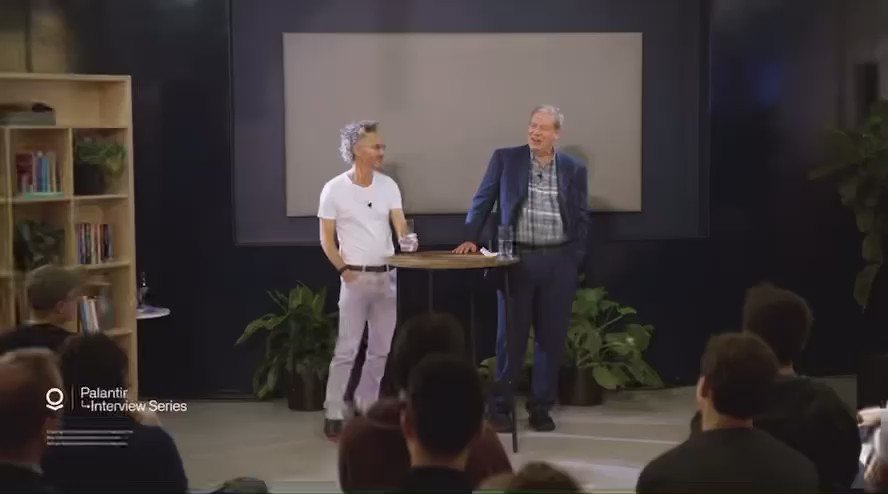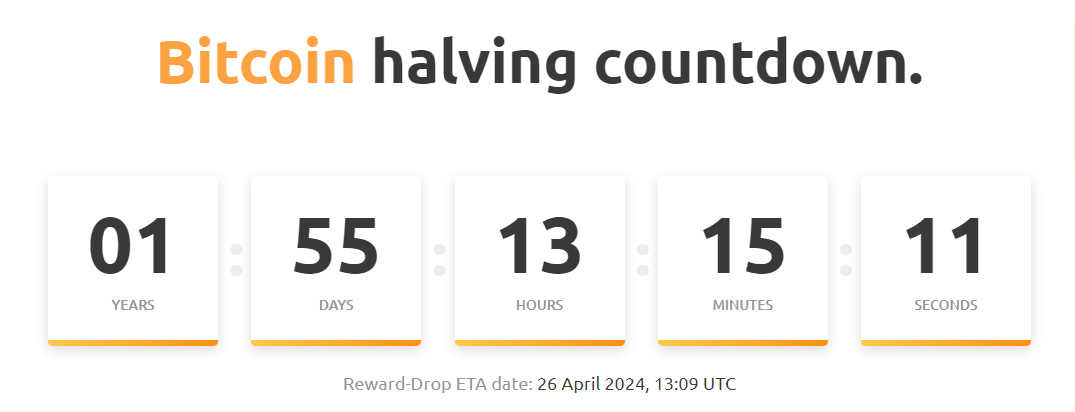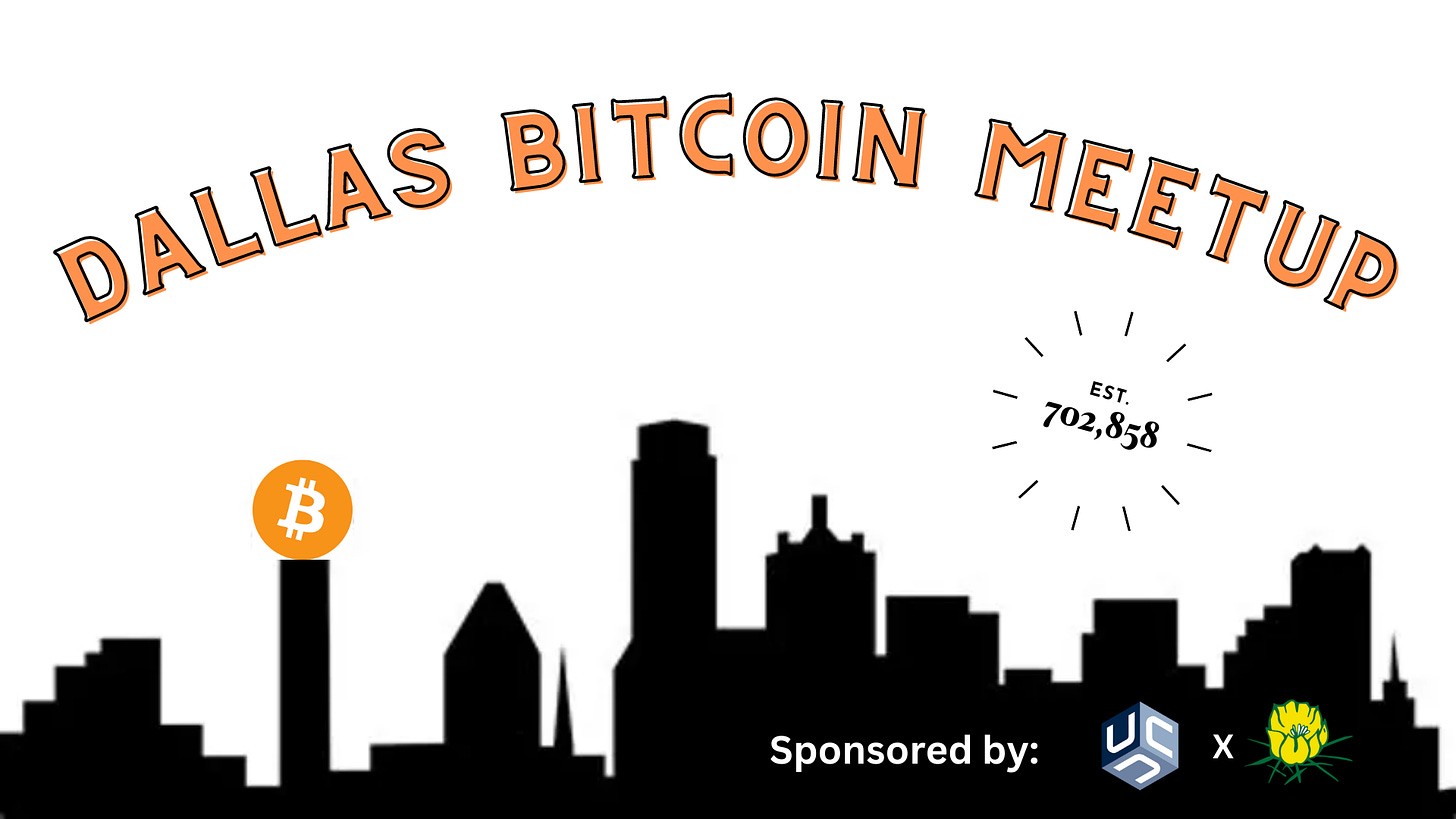Howdy folks and Happy Texas Independence Day to all of my compadres down here in The Lone Star State! Welcome to The Dallas Bitcoin Standard, a publication dedicated to covering key developments in Bitcoin, an open monetary network which operates independently of any Government or financial institution. Saddle in and let me know what you think in the comments section at the end!
Coming off of one of the best Januarys in years, February was undoubtedly a challenge. The theme in my conversations over the last month has been a lack of belief in the sustainability of the relief rally that kicked off the year. The slowing of progress in reducing inflation and a tightening labor market coupled with the FEDs “higher for longer” guidance have stymied markets, bitcoin included.
If your outlook over the next 6 to 12 months is hazy, don’t kick yourself too bad because you’re in pretty good company.

Regardless, being the closest thing to a perfectly competitive market that we have, bitcoin humbles us. Since my first investment in 2017, one thing I’ve noticed about bitcoin is that it almost always moves in the direction of maximum pain, both to the upside as well as to the downside, for even the most confident investors. So when a majority of people are telling me that they will wait until $15k to buy, I wont.
Next halvening is just over one year away. Eye’s on the prize.
More importantly, February was an epic month for the validation of bitcoin’s use case - an open, permissionless and censorship-resistant monetary network that people around the world can opt into from oppressive fiat regimes. We’re experimenting with different formats here at The Dallas Bitcoin Standard, but will be sure not to skip anything that you need to know. Let’s dig in!
Lebanon/Nigeria and the case for Bitcoin
Uncle Gary and his SEC clampdown
HRF bitcoin donation
Ray and Charlie’s not so honorable mentions
Rocky’s take
Headline: Lebanon to devalue currency by 90% on Feb. 1, central bank chief says
Bottom Line: Bitcoin’s known and verifiable monetary policy of 21 million units issued on a known disinflationary 4-year schedule fixes the problem of central banks manipulating the money supply.
Commentary: I don’t think a better case for Bitcoin’s monetary policy and uncontrollability could be more apparent.
On the first day of February, the Lebanon central bank changed the official exchange rate of the Lebanese pound from 1,507 per dollar to 15,000 - a devaluation of 90% - overnight. In addition, Lebanese banks restricted citizens from accessing their dollar savings from their banking system. This is all in accordance with a draft agreement reached with the IMF last year, that would enable the country to receive a bailout to fight it’s economic crisis, described as one of the worst in the modern era.
By running your own node, you can independently verify the monetary policy of that version of bitcoin that you support. Also, you cannot be forced to adopt one that you do not believe is in your best interest. This is the money of the future global financial system.
Headline: Old naira notes no longer legal tender, CBN warns Nigerians, banks
Bottom line: Central Bank Digital Currency (CBDC) are a byproduct of Governments in coordination with central banks having total control of the money that results in full surveillance of economic activity and of individuals wealth. Bitcoin fixes this through its decentralization and ability to custody it ourselves.
Commentary: Despite a Supreme Court ruling, the Central Bank of Nigeria (CNB) declared certain Naira notes no longer legal tender, requiring Nigerian citizens to relinquish control of their bearer wealth by depositing them into the banking system or forfeit it altogether.
The Branch Controller of the apex bank in Bauchi, Haladu Idris Andaza, described the process:
“We will receive the money from you and do our internal checks before we give you an acknowledgement which is evidence to show that we have collected that amount from you and we go ahead with our internal processes, after finishing with the internal processes, we now hit your account and credit it through your Commercial bank.”
Three mentions of internal checks and processes before acknowledging crediting customers account, nice.
The form that Nigerians must submit for the central bank’s “internal checks” include their banking information as well as personal information like phone number, email and address.
Unsurprisingly, the top google search in Nigeria, a country with over 200 million people, was ‘buy bitcoin’ during this event.


Headline: Kraken to Shut US Crypto-Staking Service, Pay $30M Fine in SEC Settlement
Bottom Line: Operation Chokepoint 2.0 is very much underway and Kraken is the first crypto company in the SECs crosshairs. The OG exchange, run by Jesse Powell (no relation to our guy Jerome), immediately ceased it’s staking-as-a-service platform for U.S. customers and paid its $30m fine to settle the lawsuit.
Commentary: It’s about time. The SEC spent 2022 doing seemingly anything besides addressing the centralized exchanges and financial companies providing staking unregistered securities, in the form of cryptocurrencies, to generate yield by egregiously rehypothecating client funds to market makers and high-risk investments pools.
Crypto’s new uncle Gary is going to have his work cut out for him in 2023, cleaning up the mess that Celcius, BlockFi, and notoriously FTX made in 2022. This quote from Gary’s SBF interview caught my eye in particular:
Gary Gensler is not new to bitcoin. Before his stint at the SEC he taught a lecture series called “Blockchain and Money” at MIT. He has commended Bitcoin’s decentralized ledger over the years as a “true innovation.” Make no mistake about it, there is a reason that bitcoin is the only cryptocurrency that is classified as a commodity (since the CFTC labeled it such in 2015), and Gary knows better than anybody why the others have not been.
Let’s watch.
Headline: The Human Rights Foundation gifts 2 billion sats (~$500,000) via its Bitcoin Development Fund to support 10 projects worldwide
Bottom Line: Since the beginning of 2020, the Human Rights Foundation (HRF) has provided funding totaling over $2.2 million in both BTC and USD to support more than 70 developers, educators, and open-source initiatives around the world.
Commentary: Given that bitcoin has no CEO, the grassroots effort has been 100% funded through proof-of-work and collaboration. The Human Rights Foundation has stepped up in recent years to support bitcoin developers and projects that are working to advance bitcoin in oppressed countries with authoritarian monetary regimes.

The funding will be given out as follows:
4.32 bitcoin ($100,000) to Qala, a fellowship program training the next generation of African Bitcoin and Lightning developers which will also allow six Qala fellows to attend the Oslo Freedom Forum.
3.24 bitcoin ($75,000) to the Africa Bitcoin Conference (remember my shout out in the 2022 year-end review??) The ABC is the leading bitcoin conference in Africa, a place that needs bitcoin more than any American could comprehend.
2.16 bitcoin ($50,000) to:
William Cascarin for his work on Nostr, a censorship-resistant, open-source and decentralized social network
Bitcoin for Fairness which focuses on raising awareness of Bitcoin for disadvantaged communities and in authoritarian states
Vasil Dimov, a top 20 Bitcoin Core contributor to ensure continued development and stability of the Bitcoin protocol
1.08 bitcoin ($25,000) to:
Emmanuel Bronshtein for his valuable contributions to wallet scrutiny
Exomunia has also been awarded $25,000 to enhance Bitcoin educational resources
Ekenimoh Elyan has received $25,000 for his initiative, EasePay
Bitcoin Myanmar has been granted $25,000 to promote education and awareness around financial freedom
Alex Gladstein, the Chief Strategy Officer of the HRF, has been an extraordinary leader in bitcoin for people around the world. With the grants, he said:
“Bitcoin is a powerful tool for human rights defenders around the world,” and these grants support their belief that “financial freedom is a human right. We are proud to support the amazing work of these individuals and organizations who are using Bitcoin to fight for human rights and freedom, especially in regions where it’s needed most.”
Not so honorable mentions
This section is one I’m still playing around with for this newsletter. Although not so honorable mentions are not key developments to the Bitcoin Network, I believe dissecting the perspectives from notable investors like Ray Dalio and Charlie Munger are interesting, especially to readers of The Dallas Bitcoin Standard. While Bitcoin does not care what you, I, or anybody in the world thinks of it, the trajectory of its ultimate adoption will be effected by thought leaders like them.
Plus it’s fun to write about!
Ray’s take
To preface, growing up, I loved reading and listening to Ray Dalio. I resonated with Ray through this time, caddying through my teens to save and to invest money in the stock market. Principles was foundational to my fascination in financial markets and ultimately a big reason why I became a financial advisor in 2017 shortly after graduating college.
On Ray’s recent podcast spree promoting his book, “The Changing World Order,” he dismisses bitcoin as a legitimate store of value while also conflating it with “crypto” and “blockchain technology,” in the same breath. Instead, claiming that a better digital currency will replace bitcoin and the one that wins, in his view, will be pegged to the inflation rate as a way to preserving purchasing power in an era of quantitative easing.
This take is so perplexing to me. Ray seems to diagnose all of the symptoms of central bank governed global financial systems today, but then fumbles the prescription. Personally, I think Ray does understand the significance of bitcoin, and that his “relatively small” allocation to bitcoin he has had since around 2019 is actually much larger than most people think (even for the largest hedge fund in the world). I believe that for some unbeknownst reason, Ray has an incentive NOT to share his actual knowledge with the general public. Also that he isn’t doing this to be buying more of it in a suppressed environment.
Playing devils advocate, if Ray understands the problem better than anyone (which he does) but genuinely doesn’t view bitcoin as the solution, the only explanation it seems is that he views inflation as an inherent component to an economic system that is productive. While inflation is stitched into the fabric of growth in today’s monetary system, it is the opposite in the parallel alternative that is Bitcoin. And that’s something that guys like Ray, who started their investment careers just before Nixon took America off of the gold standard in 1971, and the rest of Wall Street may never accept.
Oft I hear that bitcoin is a hedge against inflation given it’s scarcity and verifiable supply issuance. In reality, bitcoin isn’t a hedge against inflation, it’s the solution to it.
While it may meet the classical definition, any view of bitcoin as a hedge or as insurance, in the traditional sense, misses the most fundamental aspect of bitcoin on a wholesale basis. Bitcoin is not a hedge against inflation; it is the permanent solution to inflation, and those are two very different things. Bitcoin might be volatile, but over a long time horizon, it is not a risk. Risk and volatility are commonly conflated but in reality, are similarly very different. Volatility can present a risk depending on time horizon, but it is not inherently the same as risk. Risk speaks to future uncertainty, and hedges against risk intend to reduce future uncertainty. Bitcoin may not be widely or well understood yet, but it is more knowable than it is uncertain. The gap is one of knowledge rather than risk.
If you’re looking for some solid weekend reading, I cannot recommend my friend Parker Lewis’ article, Bitcoin is not a hedge, highly enough.
Finally, for someone who has devoted his life to studying currency collapses throughout all of history, Ray takes a suspiciously short time frame in his analysis of Bitcoin. In bitcoin we call this “high time-preference” thinking.
Would love to hear what y’all think about Ray’s takes in the comment section below!
Now onto Mr. Munger.
Charlie’s not so honorable take
Charlie Munger’s is widely regarded as one of the most legendary living investors alive. His investment philosophy can be summed up by his famous saying:
“Show me the incentive and I’ll show you the outcome.”
On the first of February, Mr. Munger published an op-ed in the Wall Street Journal titled Why America Should Ban Crypto, calling for the Government to ban all digital assets (presumably including bitcoin).
In the piece, he likens crypto to “gambling contracts with a nearly 100% edge for the house.”
Perhaps surprisingly, I agree with Charlie here! Back to Chokepoint 2.0, the SEC is well aware that pretty much all crypto projects pass the Howie Test and therefore fall under the classification of a security. Not a single one of them is yet registered as such.
However, Charlie’s take got really dark really quickly when he hailed China for their endeavors banning bitcoin, saying the U.S. should follow suit. For readers who are unaware, the ruling political party of modern day China, The China Communist Party (CCP), officially banned bitcoin and bitcoin mining in 2021. Recognizing relatively early on their inability to control Bitcoin, it makes sense why the President of a totalitarian regime like Xi Jinping would want to do this.
Though an effort by the United States to ban Bitcoin would prove futile, it would represent a very dark day in U.S. history, only to be compared to April 5th, 1933.
Aside from the politics, it didn’t take too much digging to find Charlie’s incentive for his ad hominem dismissal of bitcoin.


Working backwards using Mr. Munger’s famous line, if the outcome is that he would like bitcoin mining banned, like they did in China, it’s not a stretch of the imagination whatsoever that his incentive is in this project. Buffet and Munger’s Peaker Plants would be in direct competition with Bitcoin Miner’s in demand response programs to balance the energy grid in times of distress.
99 year-old Charlie Munger may not have the best understanding of Bitcoin, but the man sure does know how to play the game. Respect where it is due.
The convergence of energy and bitcoin mining specifically in Texas is worth an entire essay in itself, and there are plenty of good ones already out there. For an entertaining and brief overview of what’s going on down here in Texas, I’d highly suggest checking out this Bloomberg Business piece featuring Justin Ballard.

Final thought:
I was on the road for a lot of February. I think I made it to 6 or 7 different bitcoin meetups around Texas including my first trips to both Denton and Houston to hang with their crews. Great people all-around. The February Dallas Bitcoin Meetup that I co-host was the largest turnout we’ve every had, at the peak having just shy of 100 people gather at Dunston’s, the oldest steakhouse in Dallas run by a family of bitcoiners.
If you’re in Dallas and interested in learning more about Bitcoin in-person, don’t be afraid to reach out to me. You can also find details for our next event on our meetup page (link connected to the picture):
Thanks for tuning in! Stay humble and stack sats!








Rocky! Well done on the newsletter. I look forward to reading this every time you publish. It is beefy but good. The next one will be a good one too I am sure as a result of all the shenanigans going on in the markets right now; no shortage of things highlight why Bitcoin will become the standard for sure.
I will add this to my daily briefs as a must read for all and hopefully more folks in Dallas will get a taste and join the meetup at Dunston's which was A-mazing. :) Congrats again on launching a well written newsletter.